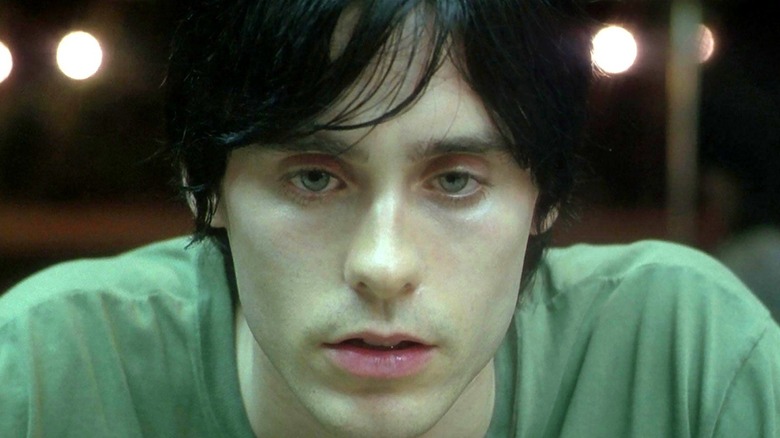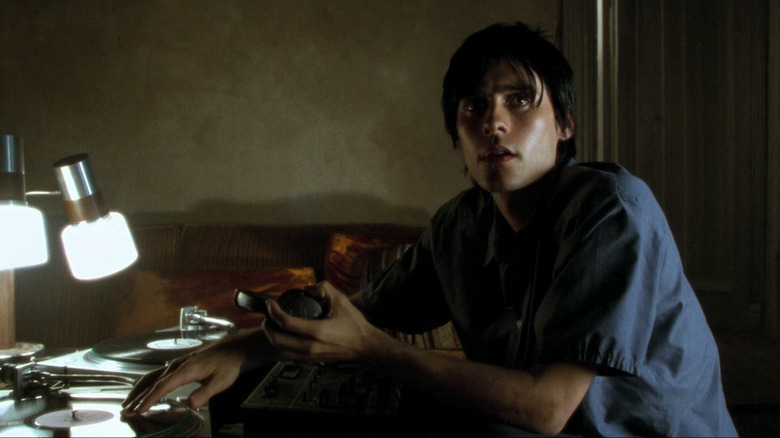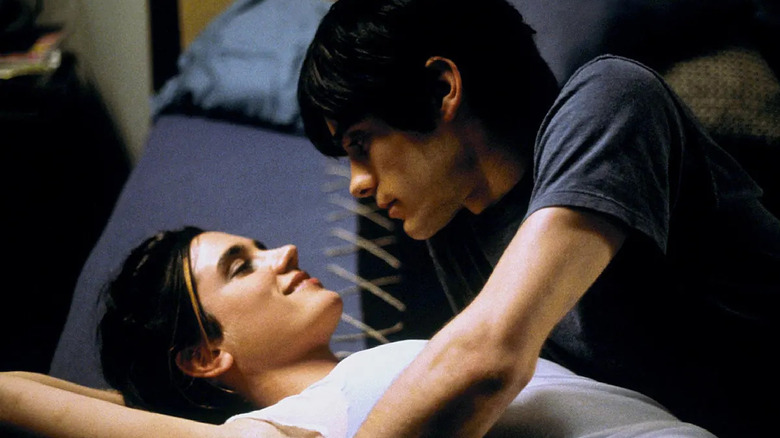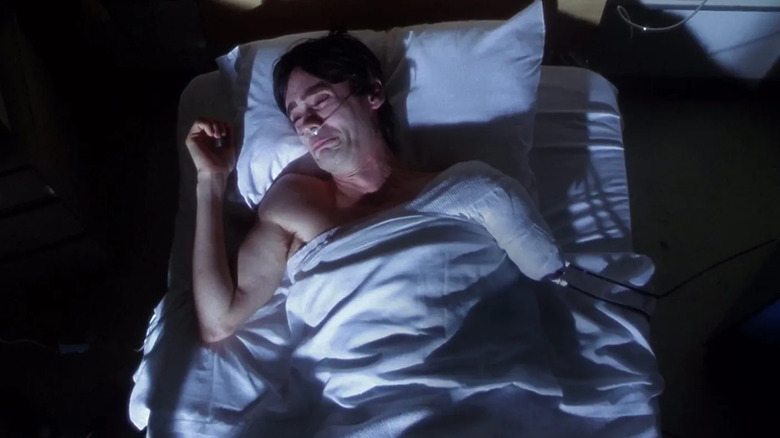Jared Leto Was Never The Same After Requiem For A Dream
If there happened to be a general consensus regarding who holds the title of "most annoying living method actor," chances are Jared Leto would be unanimously voted as victor. The actor became particularly well-known for his ultra-immersive antics while filming 2016's "Suicide Squad," which included gifting co-star Margot Robbie a live rat and doling out used condoms as a cast-wide wrap present. According to Leto, these gestures were merely a symbol of how deeply committed he was to portraying the sick, twisted persona of the Joker — a practice that proved unnecessarily grandiose considering how limited the villain's role ultimately ended up being in the film.
Leto's manic obsession with "getting in character" didn't develop overnight, though. While he appeared in a slew of critically and commercially successful films during his early acting career — from "Fight Club" to "Girl, Interrupted" to "American Psycho"—it was his role in Darren Aronofsky's 2000 film "Requiem for a Dream" that really saw the actor push himself to his mental and physical limits, resulting in a long-term ailment that Leto found incredibly hard to shake.
Assimilating among NYC addicts
For those who are a bit rusty on the plot points of Aronofsky's edgy and upsetting psychological drama, let's recap "Requiem for a Dream." Based on the 1978 novel of the same name by Hubert Selby Jr. (who co-wrote the screenplay), the film follows a group of drug addicts as they become increasingly dependent on heroin, leaving their previous ambitions in the rear-view window.
Leto plays the principal character, Harry Goldfarb, a recent college graduate from Brighton Beach, Brooklyn who sells heroin with his friend Tyrone (Marlon Wayans) and girlfriend Marion (Jennifer Connelly). Though they're ostensibly only dealing in order to fund their own personal dreams — Harry and Marion want to open a clothing boutique to show off her clothing designs, while Tyrone wants to get out of the low-income neighborhood he was raised in — it becomes clear that getting high off their own supply won't get them anywhere. This becomes especially true when a city-wide dope shortage renders their operation dry — and imminent withdrawal symptoms compound their desperation.
In order to understand the plight of New York heroin addicts, Leto claims to have completely immersed himself in this way of life, stating that "every night was an adventure." He recounts witnessing someone miss the vein in their arm and effectively poisoning themselves, as well as realizing that certain participants did not return due to their deaths from overdosing. But Leto's acceptance into this scene came with a literal price, as he was robbed once during his exploits in assimilating into the world of New York drug addicts.
Developing body dysmorphia
In order to play the role of Harry, Leto felt that he needed to lose a massive amount of weight in order to sell his character's experience. It reached a point where the actor said he felt "addicted to losing weight," a sign of an encroaching eating disorder and the hell of body dysmorphia that inevitably comes along for the ride.
Though excessive weight loss and gain are no strangers to the world of method acting, the difference between bodily discipline and dysmorphia is an incredibly fine line, if not one that's entirely blurred. This is totally supported by the fact that Leto claims he kept looking in the mirror but didn't "see himself" as being thin enough, an incredibly common (and self-destructive) symptom of developing an eating disorder, especially when it's accompanied by what Leto called "a little voice in your head" that tells you it's always possible to lose more weight.
Thankfully, as the filming of "Requiem of a Dream" concluded, so did Leto's commitment to weight loss. Clearly suffering from disordered eating and unhealthy thoughts concerning his weight, the actor decided to check himself into a recovery program.
Leto's road to recovery
In true Jared Leto fashion, the institution he sought solace in during his recovery process ended up being a monastery in Portugal. During his tenure there, he finally began re-developing the relationship to food and eating that he once had — but this process was not quick, nor was it easy.
Speaking to Albawaba, Leto recounts one specific meal as having been a major breakthrough: He successfully ate half of one single taco, which he considered an "incredibly large meal" at the time. Having previously only nourished himself with raw vegetables, this fully-cooked meal felt like an incredible feat to devour. Others in Leto's life even noticed how significant this attempt at feasting was, with one person directly applauding Leto by commenting on "how much food" the actor had just eaten — a significant departure from the few stalks of broccoli or slices of cucumber which previously comprised his entire diet.
While people are quick to clown on Jared Leto, his experience losing weight on "Requiem for a Dream" is a perfect example of just how easily body image issues can transform into full-blown eating disorders which require rigorous treatment and personal self-reflection. Sure, this one-off experience with suffering doesn't exactly redeem the fact that Leto is a bona fide method acting terrorist, gifting dead hogs and anal beads to his fellow cast members whenever the moment strikes him. However, in recognizing the reality of Leto's "very [emotionally] difficult" struggle with food, we might be able to kick the appeal of dangerously intense method acting once and for all. Pet rats everywhere, rejoice!



